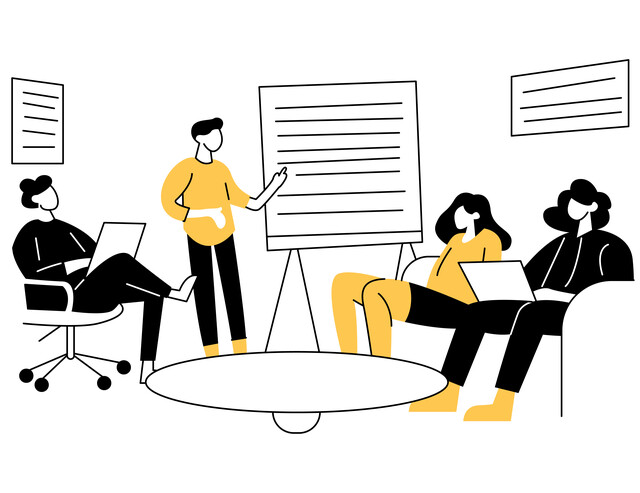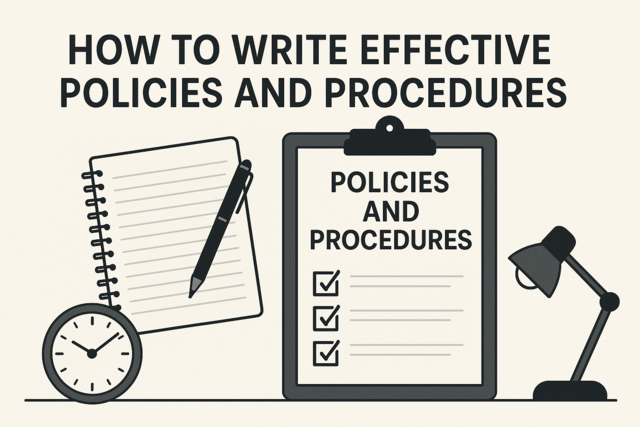Your business coaching will follow an organized process from start to finish. Each step will involve different aspects of coaching, and the process itself can be customized to the needs of your client and your own personal coaching style. The process that you create for your coaching does not need to follow the format laid out in this article, but it can be used as a guide as you make your own.
Remember, these steps are not a firm outline that you are required to follow to a T. Changes can be made, and you should consider implementing a degree of flexibility into your own coaching process design.
Preparation-Preparation is the planning and background portion of the process. During this time, you will look at the client, their goals, the business, and/or industry that they are a part of, and your abilities. You should use this time to adequately prepare for anything that may prove to be an obstacle during coaching. Ask questions about your coaching and your client and think about what challenges can arise. 1 Some questions you may consider asking:
What angle can you take in approaching your client's problems and goals? What are those problems anyway and how can they arise?
How much time is going to be needed to work on the client's goals? Is there a limit for what you or they have available?
What limits does your client have? What are your limits? How can those limits affect your coaching?
Are there incentives you can use for your client during coaching? How much of a difference could they possibly make on the outcome?
What factors are going to be in your control during coaching? What factors are not going to be under your control?
Contract- The contract step in the coaching process is the point in which you can smooth out all the details of your relationship. It the point in which you and the client will work on the more formal aspects of coaching, including any paperwork and the financial aspects of the arrangement. 2
For this step, you should look at the following to make sure that everyone involved is on the same page:
- Who is participating in the coaching? The number of people that will be participating in the coaching will affect how the sessions are set up, the cost, and the amount of work that you as the coach will need to do. 3 Making sure that you have a final tally of participants can prevent things from becoming too overly complicated later on.
- What roles and responsibilities does everyone have? Once you have a clear number of participants, you can determine what role each one of them will have. Likewise, the contract step will also be the time in which you determine what responsibilities each participant will have.
- How long will everything last? Specifically, how long will each individual session be and how long will the entire arrangement last? Part of this is making sure that everyone is on the same page, and part of it is establishing a schedule for the coaching that works for everyone.
- What are the goals and objectives? Why does the client need or want business coaching? There will not be any progress made if there is not an established reason behind it.
Start-up Session-The start-up session in the coaching process-which will be the longest-is designed to establish the tone for the rest of the sessions. During this time, you should work on establishing the relationship between you and the client. 4 A weak relationship will cause problems with the coaching, making it harder to accomplish anything. Your client will need to be able to trust you, and you them. The start-up session is often an opportunity to form and strengthen that necessary trust in your relationship with the client.
Some business coaches view the start-up session as the practice run for future sessions. It can be used to work out any hiccups that arise before they become problematic. Your client may have never worked with a business coach before and will need some time to adjust to the process, which the start-up session can do. Think of it like this: the start-up session for your client is like having training-wheels on their bike. It serves to allow them to learn the ropes in a controlled environment where the focus is on their adaptation to the routine, not results.
Regular Session-Your regular coaching sessions should include an established routine, which you can work out with your client during the start-up session. Each session should include some commonalities between all of the sessions for the sake of continuity.
The following are suggested aspects that you may want to consider apply continuity to. You may find other elements that you may want to keep the same for each session, but having some level of continuity is recommended.
- Time-A standard start time for each session will keep everyone on a schedule and make sure that no one falls behind. Having a set start time will put everyone into the right state of mind for the session. The length that the session lasts should also be something set, even if it's a general range of a minimum to maximum duration. It'll allow you as the coach to stay on track and help prevent your client from falling behind. This will also allow for everyone to plan around the sessions if they know when they will occur and for how long.
- Format-While each session should be different-presumably you will be covering a different topic per session-you should have some similarity in how you present the sessions' content. Having a schedule for your sessions will help you plan them. Your client will also appreciate the routine, as most business do have their own schedule that they work on and it will feel familiar. You should, however, allow enough room for changes in the routine of the session to avoid monotony.
- Style-As a business coach, you will develop your own style of coaching. No matter who your client is, what their goals are, or what the content of your coaching sessions are, your style will and should be a continuous element. The way you apply it may vary per client and per session, but it should remain constant once you have found it.
Final Session-The final session should be somewhat different from the rest of the sessions you have with your clients. Hence, it is often seen as a separate step in the coaching process. Like the start-up session, the final session may be longer than a regular session. This will depend on what you have planned for your regular sessions and how they have progressed up until this point.
For the final session, you may choose to do an assessment of your client's progress. This will serve to determine if the coaching has been successful, and what additional work may be needed for your client. It can also allow you to determine if you as a coach has successful in your efforts to reach your client's goals and objectives. You have the option of extending the contract between you and the client at this time, especially if they still need help with their goals. While you may have done your best as a coach, it can happen and you should not become discouraged. Many coaches choose the final session as the end of their coaching process and you are free to do so.
Wrap-up-The wrap-up is often paired with the final session, but some coaches may choose to have it as a separate step. The purpose behind it is to tie up any loose ends from the earlier steps in the coaching process. By this point, you should have achieved the main objectives-your client's goals-for the coaching arrangement. Some things you may want to address, if you have not already done so by now, during the wrap-up step may include some of the following:
- Questions-You, your client, or any of the other participants may have some final questions related to the coaching arrangement. The wrap-up is often the perfect time to answer questions not answered during the coaching. You may even include a question-and-answer portion in your final or wrap-up session. Just as the contract step of the process was designed to get everyone on the same page before things got started, this can be the time to make sure that everyone is on the same page as things end.
- Evaluations-Some business coaches choose to have an evaluation at the close of the coaching process. The evaluation can be for their client or for themselves (or both on some occasions). Evaluations can provide you with vital information about that particular coaching arrangement. You can use it to improve your skills and your personal business coaching process. It can also be formatted as a review or testimony for your services that you can later use for marketing purposes. For your client, they can use the evaluation to truly gauge their growth from where they began before the coaching.
- Loose Ends-A wrap-up can cover anything that was not included in the final session. Leaving loose ends can be both sloppy and annoying. Addressing any loose ends as the business coaching arrangement comes to a close will not only be good practice in general, but will prevent anything that still needs to be addressed from slipping through unattended. As a business coach and as someone who operates professionally, consistently leaving behind loose ends with your client can be damaging to your reputation.
-
Post Coaching-This final step is not always going to be a part of your coaching process, depending on your coaching style and your client. It can be used for a number of reasons, in a number of ways. Mainly, this step should be used to make sure that all of the work that you and the client have put into the coaching process has actually worked. 5
- Feedback-Many business coaches greatly appreciate any feedback that their clients can give them. Likewise, clients may also welcome feedback about their time during the coaching process. For both parties, any and all feedback can be used to help improve skills and professional performance. You can provide this option through things like reviews, evaluations, or follow-up interviews.
- Planning for the future-This round of coaching may not be the end of your relationship with your client. Having a post-coaching step as part of your process can lay the groundwork for the next time you work with the client. Doing so will cut down on the amount of preparation that will need to be done on your part. Even if they work with another coach in the future, any prep work that you do with the client can be to their benefit.
- Final Questions (and Answers)-Your client may have some questions for you at the end of your business relationship. Some coaches may choose to give their clients the opportunity to ask any final questions during the later steps of the coaching process. However, not everyone comes up with all of the questions they want to ask when prompted. Your clients may have questions in addition to what they asked during the final session or wrap-up step.
-
The Skills Required for Business Coaching
In order to have a successful business coaching career, you need to have the right skills. There is more to business coaching than telling someone what to do to make themselves better professionally. You need to know how to interact with your clients and how to deal with the problems that they bring to you. Often, your skills are not only going to be what you use to coach your clients, but you will often teach those same skills to them as well.
Clients will often look at the skillset of business coaches when they are looking for one. Making sure that your skills are not only what they are looking for, but are also up to the standards of the industry and your customer base. This article will cover some of the most common and prized skills in the business coaching industry. While there are additional skills that you may bring in that you acquired through experience, the follow are typically the main skills you will use as a business coach.
Communication
Effective communications skills are considered to be the number one skill that all business coaches should have and maintain. Communicating is the main aspect of coaching and business, and poor communications skills will not get you very far in any professional field. Your communications skills will form the basis for the rest of the skills you need as a business coach, like those listed in this article.
Your communication skills as a business coach can affect many different aspects of your career, such as:
- Your relationship with your clients-If you cannot properly communicate with your client, your coaching isn't going to do much good. You need to be clear and concise when you interact with your clients. They are looking to you for help, and being vague or cryptic will not only be unhelpful but will generate unwanted frustration.
- Your relationship with your peers-You may be a coach that is kept on hand at a company, or you work as one of many coaches at a coaching firm. Maybe you even have your own coaching service with several employees under your command. Whatever the case, you need strong communication skills in order for you to develop some kind of working relationship with your fellow coaches and associates. Even if you spend your entire business coaching career working solo, you will cross paths with others who are in the coaching industry.
- Your professional abilities-You may have the most fantastic coaching expertise, but it will do no one any good if you cannot effectively communicate that information. Communication skills also help you organize your knowledge and expertise into something that can be shared. It may sound amazing in your head, but if your communication skills are poor it may not sound so great once it's spoken aloud or on paper-even to yourself.
Problem Solving
Things have a habit of not going according to what people plan, and it's often why clients will approach a business coach for help. Your job is to help them work through their problems as efficiently as possible. Most coaches see their coaching as an approach that goal and solution oriented. 1 You need to have effective problem solving skills so you can help guide your clients through their own issues. This means looking for solutions, alternative answers, and what obstacles can prevent those goals from being accomplished.
If you are unsure if your problem solving skills are up to par for business coaching, or you want to keep them well honed, then you can try a few things. Many professionals who need to have strong problems solving capabilities will do exercises to keep their minds sharp and put aside their emotions. 2 Some exercises that you can try to keep your problems solving skills sharp could include the following:
- Puzzles-When you're not actively working with a client, you may want to try activities like puzzles to keep your problem solving abilities up. Puzzles are designed to have you look for a solution and they can range in level of difficulty and even have multiple answers. Doing a daily puzzle-even if it's just the crossword in the newspaper-can be a regular exercise for your mind and problem solving skills.
- Brainstorming Sessions-Brainstorming can be used in your coaching sessions to help your client with a problem, but it can also be used to help build up your problem solving skills. Try taking a problem that you see occurring in the real world-it could be something local, within the industry your clients are a part of, or something happening in your own life. You may even consider taking problems that your clients may potentially face. Take that issue and brainstorm possible solutions for it, looking for as many options as you can. Don't just look for the obvious answer, as doing so will only cause your problem solving skills to become sluggish.
Listening
Coaching is rarely ever a one-sided affair. Your client will not be the only one in the session who will be receiving information and learning. Listening is a valuable skill in business coaching because you need to be able to take feedback on your work in order to make improvements. If your client has a concern at any point in the coaching process, it is your responsibility to listen and figure out what can be done to alleviate it.
Your listening skills will need to cover more than hearing the words your clients says, but also things like body language and facial expressions. 3 Especially during the early stages of your professional relationship, your client may not verbally express their concerns or frustrations with something you are doing in your coaching. Sometimes, a coaching method just isn't working for the client but they don't want to say anything about it for fear of causing a problem. The client may not even consciously realize that they have a problem with an aspect of the coaching! Listening to non-verbal cues like body language can be the fastest, strongest, and most honest feedback that you can get during a coaching session.
Questioning
If you need to develop your questioning skills, you may want to take a simpler approach. Look at the "who," "what," "why," "where," "when," and "how" of the coaching relationship with your client. Asking basic questions of your client, sometimes as simple as "What is it you want to accomplish?" Many business coaches who have been in the business for years recommend asking questions that are open-ended instead of questions focused on solving problems. 4
The questions you ask your clients should focus on three things:
-
It may seem like an odd requirement, but being able to ask the right questions as a business coach is key. This skillset is often used for the sake of determining what your client's goals and objectives are for the coaching process. Most of the time, effective questioning is reliant on how the questions are phrased. As a result, some business coaches see this skill as a subset of their communications abilities. However, it is possible for a person to be able to ask compelling questions but have poor communication skills, and vice versa.
- Creating New Ideas-The purpose behind asking clients questions is to get their mind going on thinking about solutions that are not outright obvious. You want to get your client's creativity flowing so that they are able to become self-sustaining in the pursuit of their goals. With that in mind, you should not dismiss "wrong" answers as there may not always be a single right one.
- Building Commitment-Asking a question should cause your client's interest to generate naturally. Posing a question in a way that is less of a suggestion or order so it allows them to feel like they came up with the action on their own is going to have a greater impact on the client's progress. They will develop their own sense of ownership over their actions, and thus will be able to stand on their own when the coaching is over.
- Directing Attention-Your questions should influence your client's focus of attention to the topic or issue at hand. The goal of your questioning should be to have them look at something specific. Remember, your job is to guide them in the right direction rather than take their hand and drag them to it. Your questions should prompt the client into thinking of doing a task themselves, rather than you simply ordering them to do it. Doing so will prevent them from becoming dependent on you for help, which is not an acceptable outcome of your coaching.
Empathy
As a business coach, you want to develop a relationship with your client in order to ensure the best outcome. This relationship will be built on trust and support, which can be gained through empathy. Most people think that empathy is simply caring about another person's emotional state, but it goes far beyond that. To be empathetic is to be aware of a person's emotions and relate to them. 5 It also keeps you human while you coach and can keep your coaching from coming across as robotic or too much like a drill sergeant.
Business coaches who are able to emphasize with their clients during coaching sessions are often viewed as more trustworthy compared to coaches who do not display empathy. If your client does not trust you, then it is unlikely that they will be fully honest with you about their problems during coaching. Clients who see their empathetic coaches are more likely to lean on them for support when they need it. That trust and support is necessary to your coaching relationship with your client because conflict can arise between the two of you without it. Simply, you want to do whatever you can to help your client, and being unfeeling will only start a fight and do harm.
Coaches who emphasize with their client's struggles find that it is easier for them to pick up on their client's struggles. As discussed with the skill of listening, clients do not always say what is on their mind and many not be fully aware of their own emotional state. Empathy can be another way of translating the meanings behind your clients' body language, thus making it easier for you to adequately complete your role in the relationship. It will also make any interactions between you and your client go much smoother and easing any awkwardness that may arise during the early stages of the coaching process.
Efficiency
Another skill that you will need as a business coach is efficiency. In other words, you need to be able to do what you do as effectively as possible without making unnecessary detours in the process. Business coaches who are efficient tend to not waste their client's time. When they are looking for a solution for a problem, they do so with the intent of finding it as quickly as possible and without messing around.
If you're unsure if you and your coaching abilities are truly efficient, look at your personal coaching process. What are the parts of it are vital to reaching clients' goals and what isn't? Do you have irrelevant tasks for your clients to do that really don't accomplish anything? Go through your methods and cut out anything that isn't truly needed. Look at what you've done with past clients and go through evaluations and reviews. What worked? What didn't work? If you want to hone your efficiency skills, try cutting out the fat from your coaching.
Clients will look for business coaches who are efficient, often looking at how they apply their skills, how organized they are, and their time management capabilities. They will look at how well you do something and how long it takes you to do it. If you have a lot of unwanted fluff and filler in your coaching, clients are going to think that you are just looking to waste their time in exchange for money. The more efficient you are, the more likely clients will see you as a competent business coach worthy of their time and efforts.























